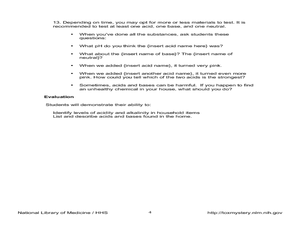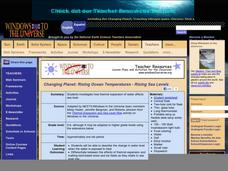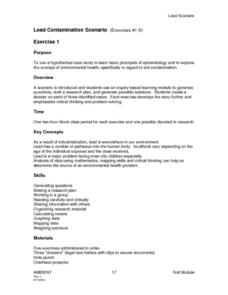Curated OER
Acid or Base? Toxie's on the Case
Students recognize the difference between acids and bases. In this ToxMystery instructional activity, students play a computer game and experiment to find the difference between acids and bases. Students use litmus paper to determine if...
Curated OER
How Do We Use Scientific Inquiry To Solve the World's Problems?
Ninth graders examine how a scientific investigation is performed. They read and discuss examples of various scientific experiments, design an experiment involving fast growing plants, and create graphs and charts to present their...
Curated OER
Exploring Basic Physical Science Concepts
Young scholars use the concepts of simple machines to construct a mobile. The inquiry is made in groups and presentations are made by constructing reports. The assessment is based upon the final product of the mobile and how students use...
Curated OER
Colds and Germs
Students determine how diseases are spread from one person to another. They investigate the importance of hand washing to reduce the spread of common colds and other diseases. They listen to teacher read alouds and complete an inquiry...
Curated OER
Investigating Plant Pigments: A Guided Inquiry Laboratory Experiment
Students participate in a three-part lab in which they investigate plant pigments. Part I is designed to teach basic laboratory techniques of column chromatography, in Part II students design an experiment to separate the components of a...
Mascil Project
Epidemics: Modelling with Mathematics
The Black Death epidemic is responsible for more than one million deaths in the United Kingdom. An inquiry-based activity has young scholars explore the rate of disease spread. They then analyze graphs showing data from epidemics such as...
Curated OER
Designer Colors, an Inquiry Approach to Flame Testing
Students investigate the spectroscopic colors unique to elements, and to use this information to create a specific color. They follow a detailed schematic to produce a spectroscpoe to be used in the testing.
Concord Consortium
Exploring Hydrophobic Core
How do the hydrophobic and hydrophilic regions of a protein affect its shape? Science scholars explore the molecular properties of protein molecules using a detailed interactive. The resource allows the user to rotate the protein, view...
K20 LEARN
Periodic Shuffle: Introduction to Periodicity and Electron Configuration
No matter how you shuffle the elements, their electron configurations keep them in the same order. How can that be? Introduce the concept of periodicity through a lesson that combines inquiry, discussion, and comparison. Partners...
Curated OER
Acid and Base Testing 2
Students design and conduct an experiment on unknown solutions after studying descriptions of indicators and the way in which they identify acids and bases. Students must gather, organize, and analyze data as well as make inferences...
Science 4 Inquiry
An Investigative Look at Florida's Sinkholes
In May of 1981, the Winter Park Sinkhole in Florida first appeared and is now referred to as Lake Rose. Scholars learn about the causes of sinkholes through an inquiry project. Then, they analyze recent data and draw conclusions to...
Curated OER
Close Encounters
Young scholars investigate the cause of death of a fictitious school janitor. They develop hypotheses based on information discovered by examining the labels of household chemicals.
Curated OER
Changing Planet: Rising Ocean Temperatures - Rising Sea Levels
As an anticipatory set, young environmental technicians watch a video about how ocean temperatures seem to be changing along with the global climate. They perform a laboratory demonstration with the purpose of observing what happens to...
Baylor College
Heart Rate and Exercise
What is the relationship among the heart, circulation, and exercise? Your class members will explore first-hand how different physical exercises affect an individual's heart rate. They will begin by learning how to measure their own...
Baylor College
Serving Sizes
Are serving sizes for different foods always appropriate for what you need? For this hands-on activity, learners work in groups to estimate what one serving size of various foods are, and then evaluate their hypotheses by measuring real...
Curated OER
Ships 2: What Floats Your Boat?
Students design, build, and test the specifications (water displacement and load line) for a model boat. The lesson focuses especially on integrating design principles with inquiry-based experimental skills.
EduGAINs
Understanding Viscosity through Investigation and Comparison of Fluids
Not all liquids are the same. Investigate the viscosity of different fluids with a series of activities designed for eighth grade science. As learners move through learning centers with different experiment setups, they determine the...
Curated OER
Hey, I've Got A Question!
Seventh graders explore the Solar System. They develop a research question and use inquiry-based research skills to find the answers to their questions. Students write up their findings and create a multimedia presentation.
Curated OER
Inquiry-based Investigations into Pond Water Microorganisms
Pupils become familiar with common microorganisms and experience exploring the microbial world.
Curated OER
Cold Hard Facts...What Inquiring Minds Will Know
Students work with "ice" in order to gain a practical application of math concepts that evolve into an inquiry-based study. They determine if the dimensions of the ice make a difference in the way the ice floats in the water.
Curated OER
ABCs of Hydrogen and Fuel Cells
Young scholars are introduced to the concept of hydrogen technologies through inquiry-based classroom activities.
Curated OER
AIDS, HIV, & Other Microbe Matters
Students conduct inquiry-based research for basic information about microbes, infections, and HIV, the virus that causes AIDS. After gathering answers to their questions, students develop a presentation to post on their school's Web site.
Curated OER
Fostering Geospatial Thinking: Space to Earth: Earth to Space (SEES)
High schoolers locate and access data to help them with their science inquiry. In this geographical positioning lesson students evaluate and compare data sets.
Curated OER
Lead Contamination Scenario
Learners are introduced to a scenario, and students use an inquiry-based learning module to generate questions, draft a research plan, and generate possible solutions. They create a dossier on each of three identified cases.
Other popular searches
- Inquiry Based Science
- Inquiry Based Science
- Inquiry Based Science Lessons
- Inquiry Based Science Water
- Inquiry Based Learning Science
- Inquiry Based Life Science
- Inquiry Based Science Lessons
- Inquiry Based Science Sose
- Inquiry Based Science Souse
- Inquiry Based Physics Science

























